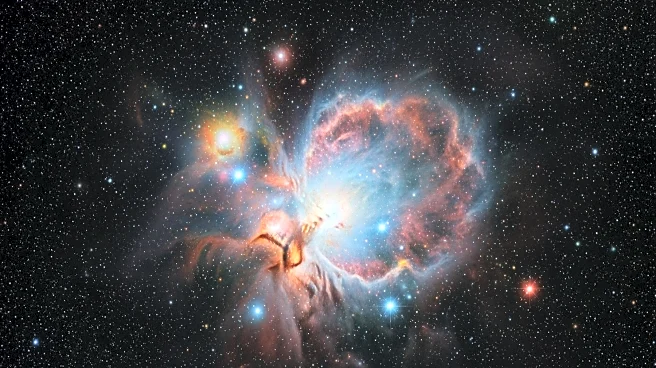What's Happening?
The Hubble Space Telescope, launched on April 24, 1990, has been a pivotal instrument in advancing our understanding of the universe. Named after astronomer Edwin P. Hubble, the telescope has made significant
contributions, such as determining the atmospheric composition of planets around other stars and discovering dark energy. Despite an initial flaw in its primary mirror, Hubble underwent several servicing missions that improved its optics and efficiency, allowing it to become one of the world's most productive scientific instruments. Over the years, Hubble has captured images of galaxies and contributed to understanding the universe's evolution, black holes, and the life-cycle of stars.
Why It's Important?
Hubble's contributions have been crucial in shaping modern astronomy and cosmology. Its ability to observe distant galaxies and phenomena has provided insights into the universe's age, expansion rate, and the presence of dark matter. The telescope's findings have influenced scientific theories and models, impacting research and education globally. Hubble's success has paved the way for future space telescopes, such as the James Webb Space Telescope, which will continue to explore the cosmos. The data collected by Hubble has been instrumental for astronomers worldwide, leading to thousands of scientific papers and discoveries.
What's Next?
As Hubble continues to operate, it is expected to provide valuable data until at least 2025. The telescope's ongoing mission will focus on observing distant galaxies, star formations, and cosmic phenomena. The upcoming James Webb Space Telescope will complement Hubble's observations, offering deeper insights into the universe's origins and structure. Researchers anticipate that Hubble's legacy will continue to inspire future generations of astronomers and scientists, fostering advancements in space exploration and technology.
Beyond the Headlines
Hubble's impact extends beyond scientific discoveries; it has also influenced cultural perceptions of space and the universe. The stunning images captured by Hubble have inspired art, literature, and public interest in astronomy. The telescope's ability to reveal the beauty and complexity of the cosmos has sparked curiosity and wonder, encouraging people to explore and appreciate the universe. Hubble's legacy is a testament to human ingenuity and the pursuit of knowledge, highlighting the importance of scientific exploration and collaboration.









